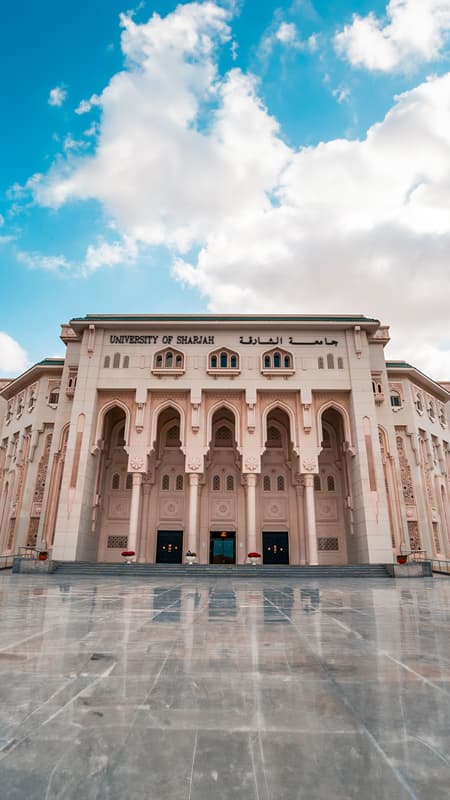An International Law to Combat the Effects of Future Viruses … Integrating Electronic Litigation Systems Among the Most Important Recommendations of the University of Sharjah’s College of Law Scientific Forum
The College of Law at the University of Sharjah concluded the activities of the International Scientific Forum "The Substantive and Procedural Legal Aspects of the COVID-19 Pandemic." The College organized the Forum under the patronage of His Excellency Prof. Hamid M.K. Al Naimiy, Chancellor of the University of Sharjah, via the virtual communication platform Zoom. Prof. Imad El Din Abdul Hay, Dean of the College of Law, participated in the Forum along with Prof. Sanford R. Silverberg, keynote speaker from the USA, faculty members, researchers, graduate students, and participants from several international universities.
The College organized the Forum to keep pace with all the scientific developments and societal issues resulting from the spread of COVID-19, to study, analyze and draw up from its important results and determine its legal dimensions and their substantive and procedural implications for the service of science and society. This crisis is also one of the global health developments that have greatly affected all countries in various sectors, including the health, economic, social, and legal sectors. The Forum included several scientific sessions in which many researches and specialized scientific papers related to the COVID-19 pandemic, its legal adaptation, and ways to mitigate its negative economic effects on all contractors and their ability to renegotiate to mitigate these effects. Some of the research and scientific papers presented the legal impact of the pandemic on intellectual property rights, work contracts, and the accompanying contract termination of many commercial and industrial establishments.
The research and studies presented within the scientific sessions of the Forum reached several important results, which will help researchers, jurists and judges to obtain an accurate and deep scientific perception of its legal dimensions and practical effects in various fields of law. The most prominent of these results was the jurisprudential and judicial debate of the legal adaptation of COVID-19 as it has become one of the core issues that entail very important results and upon which judgments can be based. The Forum also addressed the impact of this pandemic on commercial contracts required dealers to reconsider the formulation of these contracts, and the inclusion of a re-negotiation clause. The spread of this virus also constituted a temporary barrier for litigants not exercising their rights to submit their judicial requests and follow up on the progress and implementation of their cases. The UAE legislator was also keen to protect the right of people to privacy and the sanctity of private life in light of the pandemic by stipulating the confidentiality of data and information related to their infection with this virus or their health condition.
The Forum also reached an important set of recommendations that must be taken to face the challenges and effects of this virus at various levels from the legal point of view, including: the necessity to define the obligations and procedures followed to avoid future viruses under international law, the necessity to regulate the means of renegotiation in all contracts, especially commercial contracts; and the need for parties to agree to stop the implementation of the contract when the re-negotiation clause is made. The Forum also recommended the need to integrate electronic litigation systems to face global emergencies without the necessity of the personal presence of litigants; the importance of focusing on expanding legislative texts related to crimes of abstaining from reporting; and the need to preserve the confidentiality of information related to whistleblowers with the need to impose severe penalties on those who leak this data.
The Forum also proposed the need for re-drafting the legislation related to the crime of deliberately transmitting a communicable disease to others, to include imprisonment as a compulsory punishment. It also recommended establishing mechanisms for work contracts in light of crises to protect both parties through the development of more flexible legal texts in line with the current conditions; the obligation of business owners to establish funds to guarantee workers' wages in times of crises; as well as the need to establish an insurance fund in the private work environment against health disasters and their economic and social consequences. Likewise, it recommended obligating establishments with more than 50 workers to contract with an insurance company against exceptional risks such as the COVID-19 pandemic and others. In addition, it proposed the necessity to integrate and apply the rules of international law to confront future and current global pandemics, and to increase the awareness of community members of the extent of the risk of the spread of COVID-19.
The need for the United Arab Emirates to adopt the call for an international work agreement that focuses on remote work, and to include a sample employment contract that to guide countries. The Forum also discussed the need to amend the UAE Industrial Property Law by adding articles that regulate the technology transfer contract to ensure that national projects have control over the technical knowledge that is the subject of the technology transfer contract. It also guarantees them the right to reverse engineering technology to COVID-19 vaccines and drugs, and a technical method to obtain industrial secrets involved in preparing industrial products by discovering the technical principles and technical elements based on them, and then being able to reproduce them independently.



